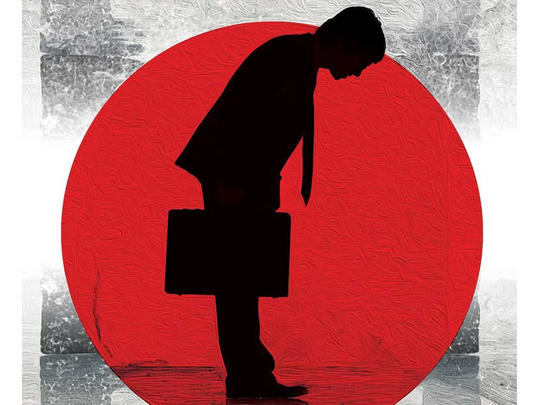
Hisao Tanaka, Toshiba’s chief executive, gave a 15-second bow as he resigned over a $1.2 billion (Dh4.41 billion) accounting scandal. Tanaka and seven other executives took responsibility for deceptions that started in 2008.
Taro Aso, Japan’s finance minister, warned that this could “lose the market’s trust”.
Aso is right that the debacle at one of Japan’s leading industrial conglomerates, on paper a leader in corporate governance reform, is serious. Together with the $1.7 billion fraud exposed by Olympus’s chief executive Michael Woodford in 2011, it suggests that Japanese companies are prone to manipulating their accounts.
But foreign investors should not give up and go home.
The reverse is true. Here is an opportunity — whether to short shares in companies that will be struck by scandal next, to buy those that will be forced to change their ways, or to do both these things in turn.
Japan is an imperfect market and its slow, bumpy, yet inexorable progress towards cleaning up its corporate act provides a target.
Japan is not unique in any of this, despite a succession of scandals over the past two decades at Yamaichi Securities, Kanebo, Nikko Cordial, Livedoor and others.
The US was a pioneer with Enron and WorldCom in the early 2000s, and companies in many countries understate losses, misprice contracts and overstate revenues.
Managers at US or European companies will also groan in sympathy at the pressure Toshiba’s executives felt when faced with “challenges” from their head office to squeeze out higher profits at results season. At Toshiba, they responded by cooking the books, helping the bosses to hide the damage done by the 2008 financial crisis and the 2011 Fukushima earthquake.
The difference in Japan is that losses get handed down across generations, hidden on behalf of previous bosses. There is no such thing as the kitchen sink- the grand writing-off of underperforming divisions and old problems by a new chief executive, publicly ditching the errors of his or her predecessors instead of inheriting the burden.
The first thing Norio Sasaki should have done when he became Toshiba’s chief executive in 2009 was expose his predecessor, Atsutoshi Nishida, under whom the deception started. After all, the two were rivals, disliked each other, and even squabbled at a 2013 press conference to announce that Sasaki was stepping down to become vice-chair.
But even with a motive, a weapon, and an opportunity, Sasaki refused to wield the knife, instead taking on and expanding the deception. One obstacle was that Nishida had become chairman and was looking over his shoulder — in Japan, the old boss never quite departs.
Japanese companies also prize loyalty and social cohesion. “There are lifelong relationships between superiors and juniors. You often place your loyalty for the whole of your career with the person who showed you around when you first entered the company,” says Simon Wong, a visiting fellow at the London School of Economics.
As a result, many of the corporate governance reforms encouraged by Shinzo Abe’s government are adopted more in theory than in practice. These include the hoped-for shift from boards being inwardly-turned management committees to bodies on which outside directors play a significant role in strategic decisions, executive appointments and financial oversight.
Toshiba is a prime example. It is a blue-chip, bigger and more significant than Olympus, and was regarded as a reform pioneer, appointing independent directors in 2001 and forming board committees, including its easily deceived audit committee, in 2003.
But two of the four outsiders were former diplomats, lacking financial expertise, and little really changed.
The government seeks reform to attract investment and boost growth. But the corporate code introduced in June betrays Japan’s ambiguity — and the doubts of traditionalists such as the Keidanren business federation — about empowering boards.
The code includes an assurance to managers that it “does not place excessive emphasis on avoiding or limiting risk, or the prevention of corporate scandals,” and asks only for companies to appoint “at least two” independent directors.
Japan needs to be tougher than that to counter scandals such as those at Olympus and Toshiba.
The direction of travel, however, is clear. At Olympus and Toshiba, executives placed internal loyalty above their obligations to shareholders.
They lied instead of telling the truth and were exposed in both cases by whistle-blowers who took a wider view of managerial responsibility, one supported by the government and regulators.
A market in which misdeeds have been concealed for a long time and executives are struggling to maintain the deceit offers opportunities as well as pitfalls. Olympus is worth twice as much as it was shortly before the scandal was revealed in 2011, and 10 times as much as at its lowest point.
Toshiba’s management clear-out offers similar potential for a corporate revival.
Japanese equity investing is for the brave and risk-tolerant but this is no time to retreat. Tanaka did more than show contrition. He also bowed to the inevitable.
— Financial Times











